World
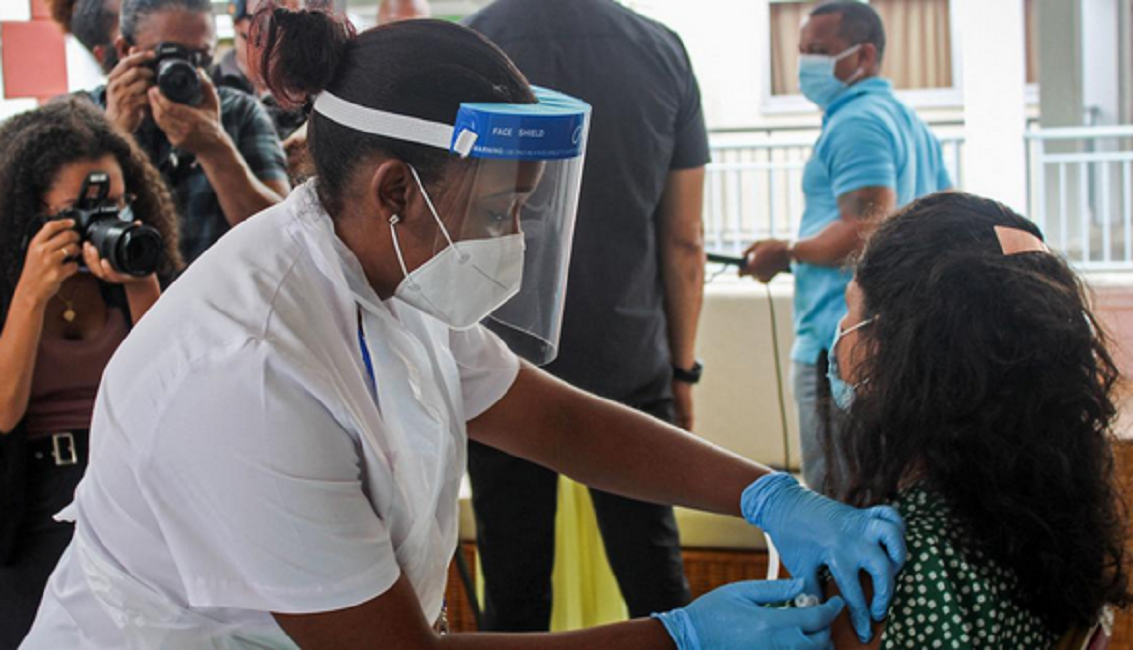
The Seychelles: Covid cases on the rise in the most vaccinated nation on earth
The Seychelles is causing concern for world health experts after a rise of Covid-19 cases among fully vaccinated individuals.
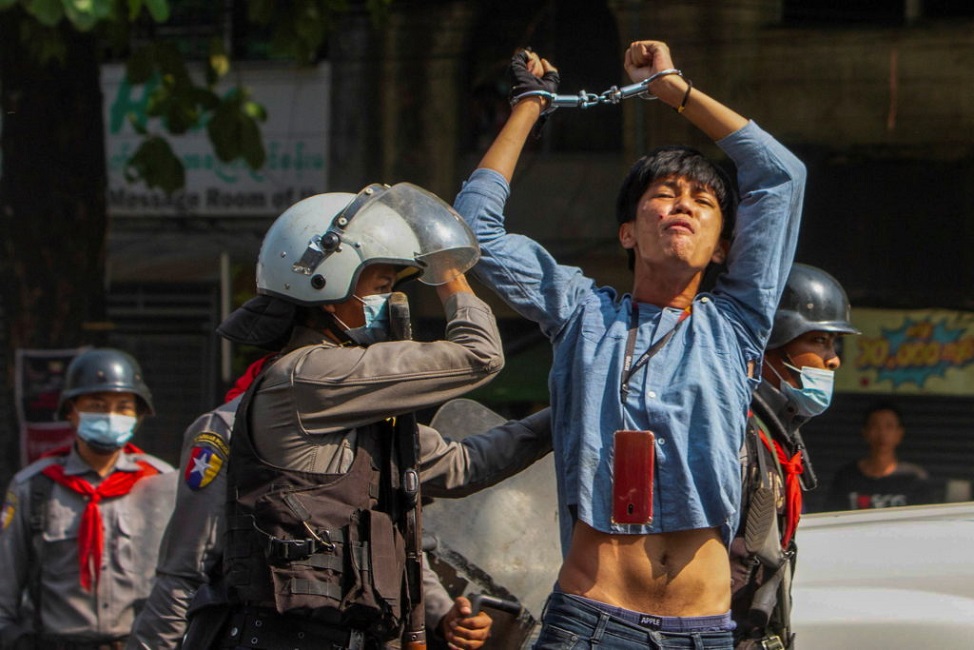
Myanmar death toll rises as Chinese factories are torched
Myanmar's military has extended martial law to broader sections of Yangon after the deaths of dozens of protesters in the city's garment production hub, where several Chinese factories have suffered arson attacks.
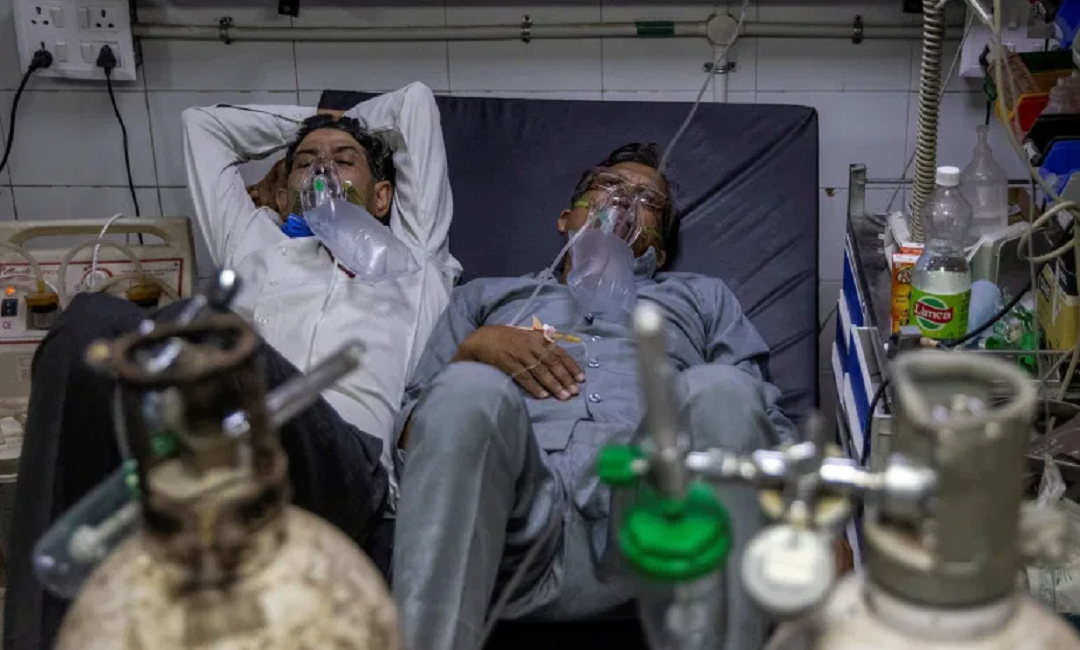
Coronavirus 'swallowing' people in India; crematoriums overwhelmed
NEW DELHI, Delhi — With life-saving oxygen in short supply, family members in India are left on their own to ferry coronavirus patients from hospital to hospital in search of treatment as the country is engulfed in a devastating new surge of infections.

Facebook to reverse news ban on Australian sites
Facebook will walk back its block on Australian users sharing news on its site after the government agreed to make amendments to the proposed media bargaining laws that would force major tech giants to pay news outlets for their content.
It follows days of negotiations between the government and the social media company, including discussions between Treasurer Josh Frydenberg and Facebook boss Mark Zuckerberg.
"Mark Zuckerberg said to me today [restoring pages] will occur in coming days," Mr Frydenberg said.
The code is structured so that if Facebook and Google do not sign commercial deals with traditional media outlets the Treasurer can "designate" them, and force them to pay for access to news content.
The government promised to make further amendments to the code, including giving Facebook more time to strike those deals.
Last week Facebook stopped Australian users from sharing or posting news links in response to the code.
A number of non-news pages were swept up in the ban, including community organisations and the Bureau of Meteorology.
Facebook said in a statement that it was "pleased" the company was able to reach an agreement with the government.
"[We] appreciate the constructive discussions we've had with Treasurer Frydenberg and Minister Fletcher over the past week," it said.
"After further discussions, we are satisfied that the Australian government has agreed to a number of changes and guarantees that address our core concerns about allowing commercial deals that recognise the value our platform provides to publishers relative to the value we receive from them. As a result of these changes, we can now work to further our investment in public interest journalism and restore news on Facebook for Australians in the coming days."
But the company's vice president Campbell Brown said Facebook was retaining its right to take Australian news content down again in the future. (ABC News)
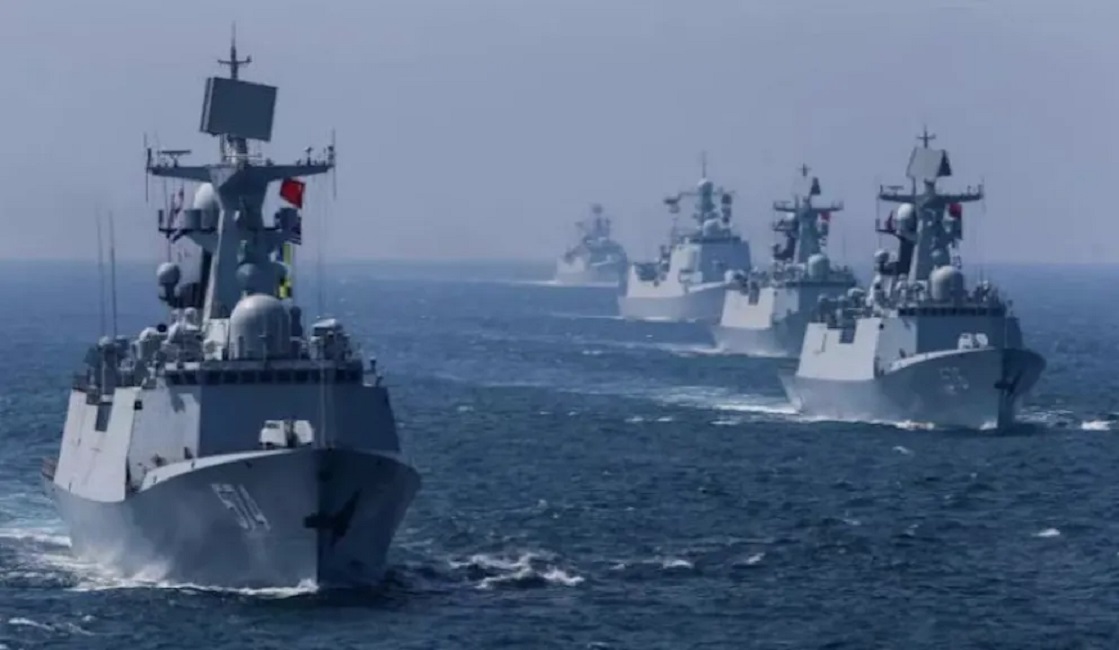
Chinese Navy seeks to be more ‘port’able
One of China’s strengths – as an authoritarian communist state – is its ability to wield a whole-of-nation approach to security, diplomatic and economic affairs around the globe.
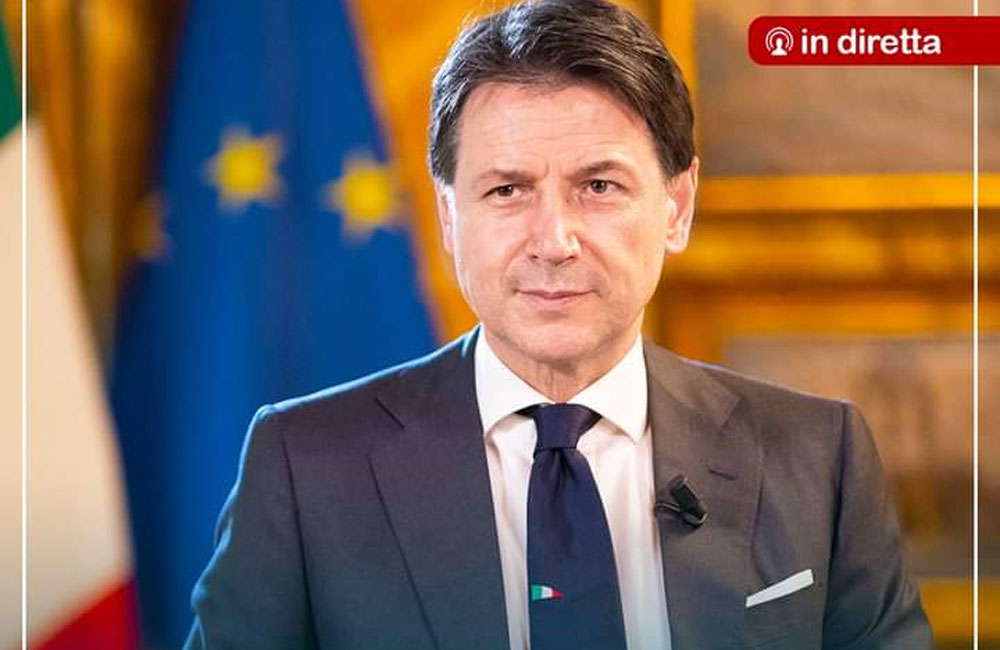
Italy's Mario Draghi sworn in as Prime Minister, taking the reins of a country in crisis
The 73-year-old, known as Super Mario for doing "whatever it takes" to save the eurozone, has put together a national unity government involving almost all Italy's political parties.
"Break a leg," read the headline on La Stampa daily Saturday, hours ahead of Draghi and his new cabinet being sworn in under rainy skies in Rome, as a new survey showed the former banker had the support of 62 percent of Italians.
Draghi was parachuted in by President Sergio Mattarella after the previous centre-left coalition under premier Giuseppe Conte collapsed, leaving Italy rudderless at a critical time.
Italy is battling the pandemic that hit one year ago, leaving more than 93,000 people dead and triggering the country's deepest recession since World War II.
Draghi has spent the last 10 days assembling a broad-based coalition and on Friday night formally accepted the post of prime minister in a meeting with Mattarella.
He spoke only to read out a list of his cabinet -- a mix of technocrats, veteran politicians and existing ministers, a third of them women -- but returned at noon Saturday to be formally sworn in at the presidential palace.
Draghi will be presented to the upper-house Senate on Wednesday followed by the chamber of deputies on Thursday for a confidence vote that will give the final official blessing to his government.
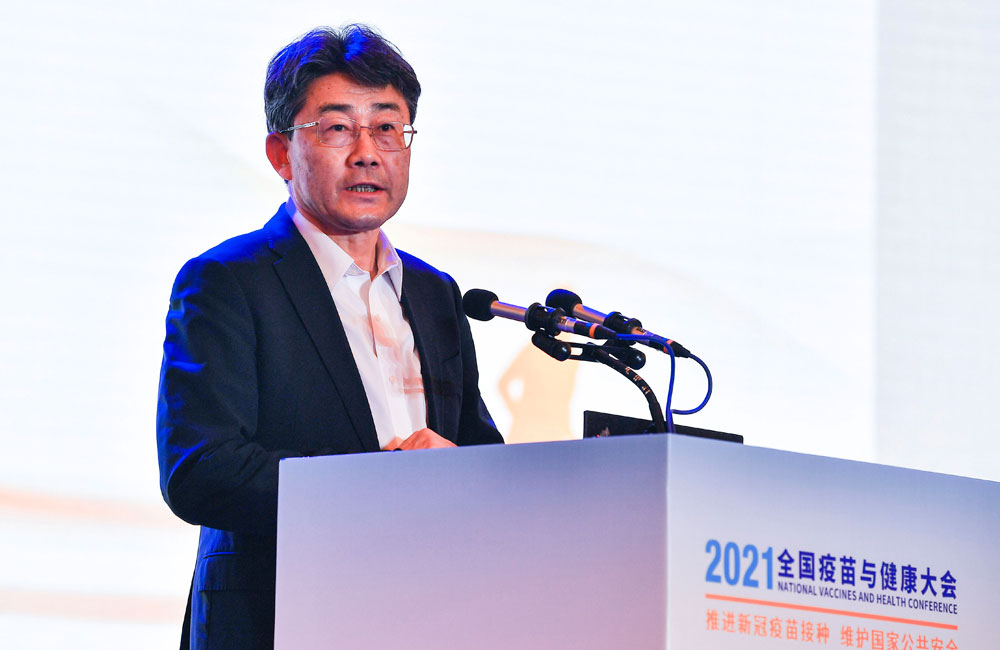
Top Chinese official admits vaccines have low effectiveness
BEIJING (AP) — China’s top disease control official, in a rare acknowledgement, said current vaccines offer low protection against the coronavirus and mixing them is among strategies being considered to boost their effectiveness.
China has distributed hundreds of millions of doses of domestically made vaccines abroad and is relying on them for its own mass immunization campaign.
But the director of the Chinese Center for Disease Control and Prevention, Gao Fu, said at a conference Saturday their efficacy rates needed improving.
“We will solve the issue that current vaccines don’t have very high protection rates,” Gao said in a presentation on Chinese COVID-19 vaccines and immunization strategies at a conference in the southwestern city of Chengdu. “It’s now under consideration whether we should use different vaccines from different technical lines for the immunization process.”
He also praised the benefits of mRNA vaccines, the technology behind the two vaccines seen as the most effective, Pfizer-BioNTech and Moderna, months after questioning whether the then-unproven method was safe.
In a message to The Associated Press, Gao said late Sunday night he was speaking about the effectiveness rates for “vaccines in the world, not particularly for China.” He did not respond to further questions about which vaccines he was referring to.
Vaccines made by Sinovac, a private company, and Sinopharm, a state-owned firm, have made up the majority of Chinese vaccines distributed to several dozen countries including Mexico, Turkey, Indonesia, Hungary, Brazil and Turkey.
However, the companies have not publicly published peer-reviewed data on the final stage clinical trial research and been criticized for a lack of transparency.
Sinovac’s vaccine, for example, raised concerns when it was found to have different efficacy rates from each of the trials it conducted in different countries, ranging from around 50% to over 83%.
A Sinovac spokesman, Liu Peicheng, acknowledged varying levels of effectiveness have been found but said that can be due to the age of people in a study, the strain of virus and other factors.
Beijing has yet to approve any foreign vaccines for use in mainland China.
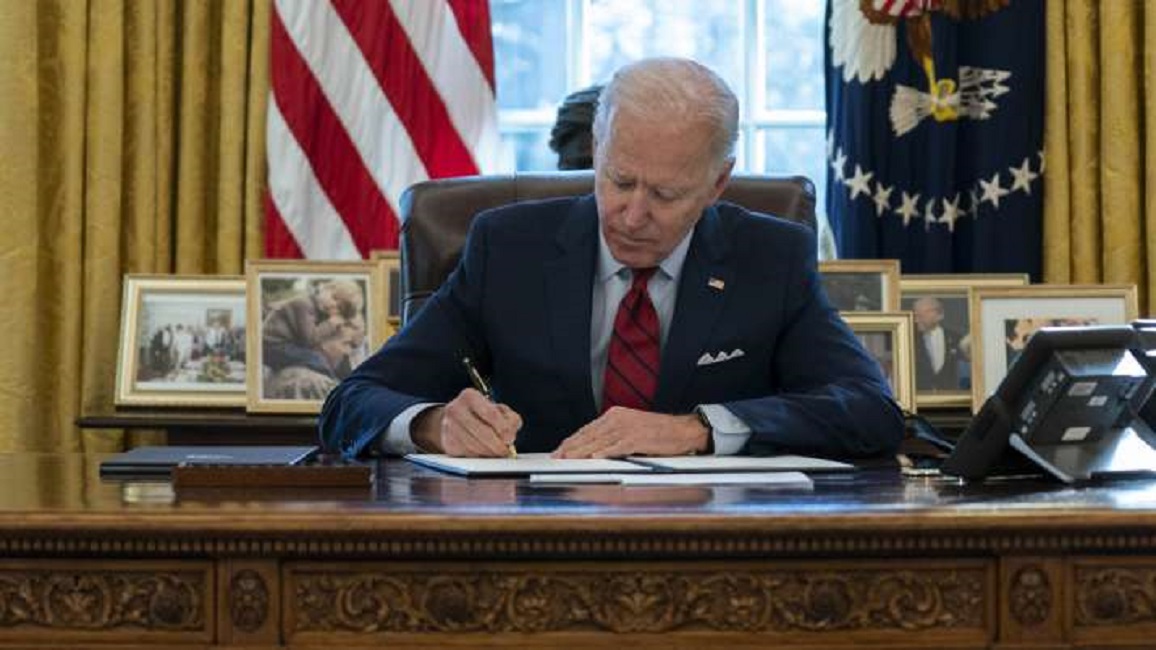
U.S. moves to rejoin UN Human Rights Council
The Biden administration is set to announce this week that it will reengage with the much-maligned U.N. Human Rights Council that former President Donald Trump withdrew from almost three years ago, U.S. officials said Sunday. The decision reverses another Trump-era move away from multilateral organizations and agreements.
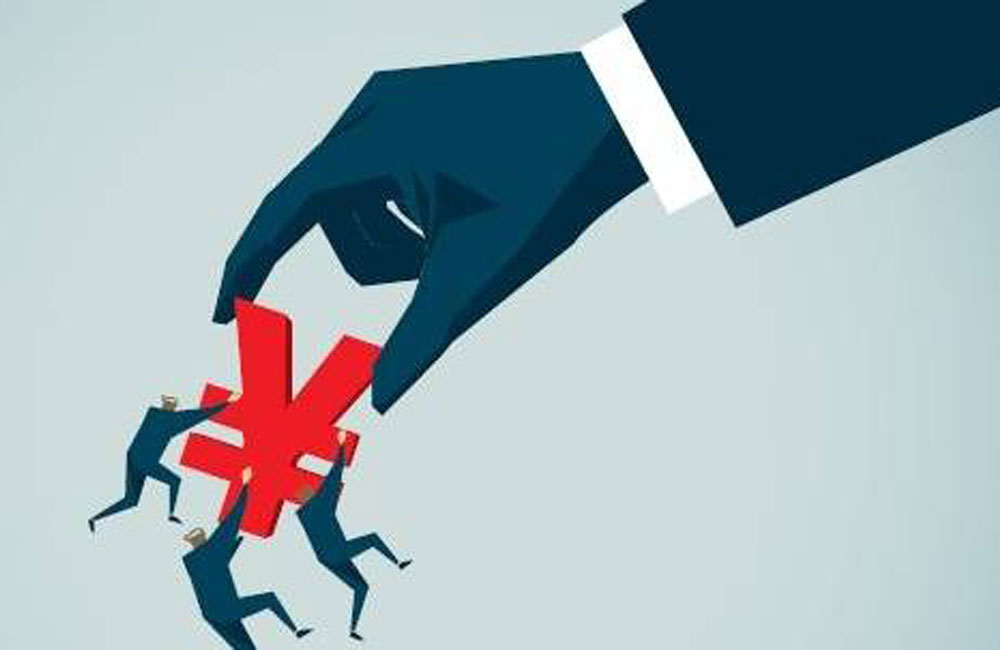
Calls grow for alternative to China's BRI as Beijing suffers severe reputational crisis
(ANI): Despite Chinese President Xi Jinping's Belt and Road Initiative (BRI) touted as a 'win-win' step over 140 targeted countries across the globe, recipient countries have realised that Beijing's aid was not as much of a kind gesture as they had hoped, hitting Beijing with a serious reputational crisis and emboldening calls for an alternative plan.
According to The Straits Times, most of the countries involved in the initiative will inevitably struggle to repay the debt servicing requirements.
This was seen when Sri Lanka admitted its mistake in trading its 'debt trap' for a 99-year Chinese lease of Hambantota Port. Bhopinder Singh wrote that China's no-questions-asked approach imposed no conditionalities on the host country to answer any awkward question on democratic freedoms, human rights and transparency.
However, now Zambians, Ethiopians and Papua New Guineans are having serious second thoughts at having entertained the Chinese, while close partner Pakistan has been reportedly witnessing murmurs of disapproval in its Senate.
Meanwhile, US President Joe Biden has mooted an alternative multi-trillion-dollar infrastructure plan to rival China's BRI.
While more than 100 countries have already inked various sub-components of the Chinese BRI conceptualisation - fears of erosion of sovereignty, debt traps and inequities have led to an all-time high fear of the Chinese 'aid' via the BRI, and therefore the search for a more equitable option, should it exist, according to The Strait Times.
Singh wrote that the US will have to deploy a more nuanced and holistic approach in terms of diplomacy, information, military and economy in countering the BRI, as the post-Trump era has left the new administration with the herculean task of repairing relations with its ostensible allies.
Although not every nation will share the same urgency, fear or even the plausible appetite for joining an alternative to the existing BRI that directly offends the Chinese, the conversations have already begun. The alternative to BRI may not only be feasible, but completely unavoidable, according to The Strait Times.
With the COVID-19 pandemic having exposed the Chinese machinations of playing down the initiatives that subsequently wreaked havoc on global economies, the BRI is now suffering a serious reputational crisis.
As the communist nation rolled out its grand initiative, isolated regimes such as Pakistan, North Korea, Venezuela, Iran, Bolivia and Myanmar were naturally drawn into the BRI budget. More than USD 800 billion has been 'invested' in eight years in the form of infrastructural projects or loans to over 60 countries.
China had already shown its ability to turn major global crises into invaluable opportunities to feed its own hegemonic instincts. The BRI imperatives planned over USD 1 trillion are clearly aimed at desperate and option-less economies, reported The Straits Times.
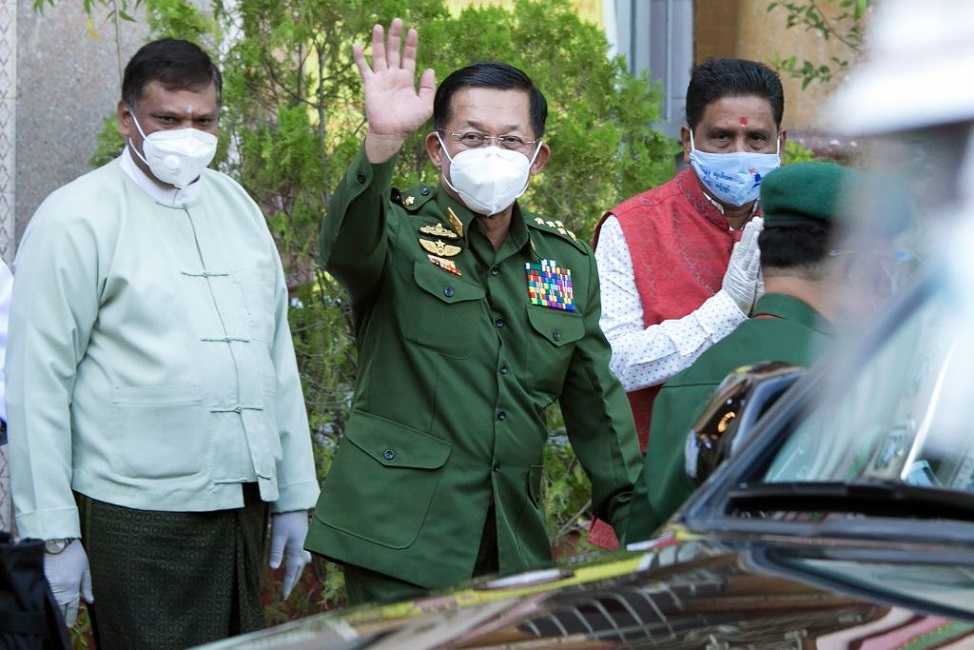
Why is the military taking control in Myanmar?
JAKARTA, Indonesia (AP) — Myanmar's military has taken control of the country under a one-year state of emergency and reports say State Counsellor Aung San Suu Kyi and other government leaders have been detained. Here are some possible reasons why the military has taken over now:
THE CONSTITUTION
The announcement on military-owned Myawaddy TV cited Article 417 of the country's constitution, which allows the military to take over in times of emergency. The announcer said the coronavirus crisis and the government's failure to postpone November elections were reasons for the emergency.
The military drafted the constitution in 2008 and retains power under the charter at the expense of democratic, civilian rule. Human Rights Watch has described the clause as a “coup mechanism in waiting.”
The constitution also reserves key Cabinet ministries and 25% of the seats in Parliament for the military, a portion that limits the power of a civilian government and rules out amending the charter without military support.
Some experts expressed puzzlement as to why the military would upset their powerful status quo, but others noted the looming retirement of Senior Gen. Min Aung Hlaing, who has been commander of the armed forces since 2011.
“There’s internal military politics around that, which is very opaque,” said Kim Jolliffe, a researcher on Myanmar civilian and military relations. “This might be reflecting those dynamics and might be somewhat of a coup internally and his way of maintaining power within the military.”
The military has assigned Vice President Myint Swe, a former military officer, as head of the government for one year.
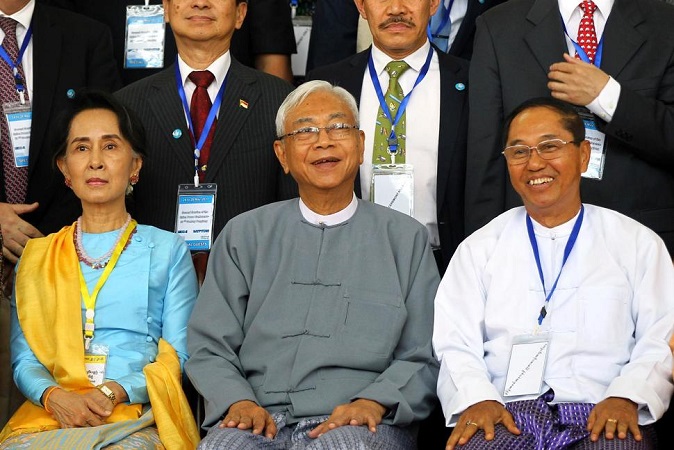
FILE - In this May 24, 2017, file photo, Myanmar's Vice President Myint Swe, right, smiles while sitting with State Counsellor Aung San Suu Kyi, left, and then President Htin Kyaw during a photo session after the second session of the 21st Century Panglong Union Peace Conference at the Myanmar International Convention Center in Naypyitaw, Myanmar. Myanmar military television said Monday, Feb. 1, 2021 that the military was taking control of the country for one year, while reports said many of the country’s senior politicians including Suu Kyi had been detained. The military TV report said Commander-in-Chief Senior Gen. Min Aung Hlaing would be in charge of the country, while Myint Swe would be elevated to acting president. (AP Photo/Aung Shine Oo, File)
THE ELECTIONS
In November elections, Suu Kyi’s party captured 396 out of 476 seats in the combined lower and upper houses of Parliament. The state Union Election Commission has confirmed that result.
But the military since shortly after the elections has claimed there were millions of irregularities in voter lists in 314 townships that could have let voters cast multiple ballots or commit other “voting malpractice.”
“But they haven’t really shown any proof of that,” Jolliffe said.
The election commission rejected the claims last week, stating there was no evidence to support them.
The military takeover came on what was to be the first day of the new Parliament following the elections.
Instead, Suu Kyi and other lawmakers who would have been sworn into office were reported detained.
A later announcement on Myawaddy TV said the military would hold an election after the one-year emergency ends and would turn over power to the winner.
WHAT'S HAPPENING NOW
Telecommunications came to a near halt in the morning and early afternoon. In the capital, internet and phone access appeared to be blocked. Many people elsewhere in the country who could still access the internet found their social media accounts had been temporarily suspended.
Barbed wire road blocks were set up across Yangon, the largest city, and military units began to appear outside government buildings such as City Hall.
Residents flocked to ATMs and food vendors, while some shops and homes removed the symbols of Suu Kyi's party, the National League for Democracy, that typically adorn the streets and walls of the city.
WHAT HAPPENS NEXT
Governments and international organizations condemned the takeover, saying it sets back the limited democratic reforms Myanmar has made.
“This is an extremely crushing blow to efforts to present Myanmar as a democracy," said Linda Lakhdhir, a legal adviser at Human Rights Watch. ”Its creditability on the world stage has taken a massive hit."
Watchdogs fear a further crackdown on human rights defenders, journalists, and others critical of the military. Even before the current military takeover, journalists, free speech advocates and critics of the military often faced legal action for publicly criticizing it.
A U.S. senator raised the possibility the United States could again impose economic sanctions, which the U.S. lifted when Myanmar was transitioning to civilian rule.
Myanmar's military leaders “must immediately free the democratic leaders of Myanmar and remove themselves from government,” said Democratic Sen. Bob Menendez, the incoming chairman of the Senate Foreign Relations Committee. “If not, the United States and other countries should impose strict economic sanctions, as well as other measures” against the military and military leaders, he said.
Former U.S. diplomat Bill Richardson said the Biden administration and other governments should act swiftly to impose sanctions. He also questioned Suu Kyi's ability to lead given her defense of the military's actions against ethnic Rohingya Muslims.
“Because of Suu Kyi’s failure to promote democratic values as Myanmar’s de facto leader, she should step aside and let other Myanmar democratic leaders take the reins with international backing and support,” Richardson said in a statement.
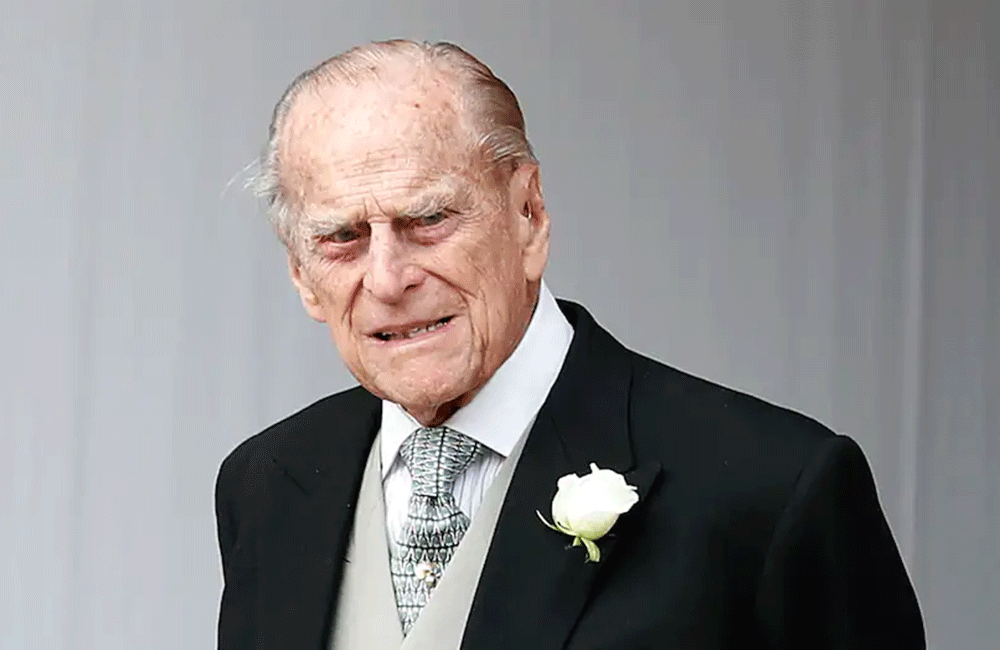
Prince Philip, husband of Queen Elizabeth, dead at 99
The Duke of Edinburgh - Prince Philip - has died, Buckingham Palace has said.
A statement from Buckingham Palace said: "It is with deep sorrow that Her Majesty The Queen has announced the death of her beloved husband, His Royal Highness The Prince Philip, Duke of Edinburgh.
"His Royal Highness passed away peacefully this morning at Windsor Castle."
The Duke was married to Queen Elizabeth II for more than 70 years and became the longest-serving consort in British history.
Into his 90s he carried out a busy programme of public engagements, reflecting his own charitable interests. Advertisement
He also travelled around the country supporting the Queen, both on state occasions and royal visits.
For a man of his age he enjoyed relatively good health.
He was taken to hospital over Christmas in 2011 for treatment for a blocked artery.
In 2012 he was admitted to hospital during the Queen's Diamond Jubilee with a bladder infection, and in 2013 had an exploratory operation on his abdomen.
But it was not until May 2017, after carrying out more than 20,000 solo public engagements, that the 96-year-old retired from his own programme of royal duties, occasionally stepping out to support the Queen for big events.
No official details have been released yet about the Duke's funeral, but it is understood he will be given a royal ceremonial funeral rather than a state funeral, in line with his wishes.
The Queen will sign off the final plans in the coming days.
Prince Philip of Greece and Denmark was born on the island of Corfu in 1921.
At the age of 18, the prince joined the Royal Navy as a cadet.
He saw active service during the Second World War, serving in the Indian Ocean and the Mediterranean, and was mentioned in despatches for his bravery.
In 1947 he renounced his Greek and Danish royal titles, took on the surname of Mountbatten and became a naturalised British subject ahead of his marriage to Princess Elizabeth.
Their wedding was the first great state occasion after the end of the Second World War.
His commitment to the Queen was unfaltering. He gave up his career in the Navy in order to support her in her role as monarch.
The Queen has described Prince Philip as her "constant strength and stay".
They had four children - Charles, Anne, Andrew and Edward - and he was a much loved grandfather and great-grandfather.
He saw himself as a moderniser within the British monarchy, orchestrating the first royal walkabout - but he was also known for his forthright views and off-the-cuff remarks.
Prince Philip's concern for young people inspired him to create the Duke of Edinburgh's Award Scheme, and he supported more than 800 charities and good causes - focusing on his interests in wildlife conservation, technology and sport.
Since the 1940s Prince Philip was an ever present figure in the life of the UK and leaves behind his own considerable legacy. (Sky News)
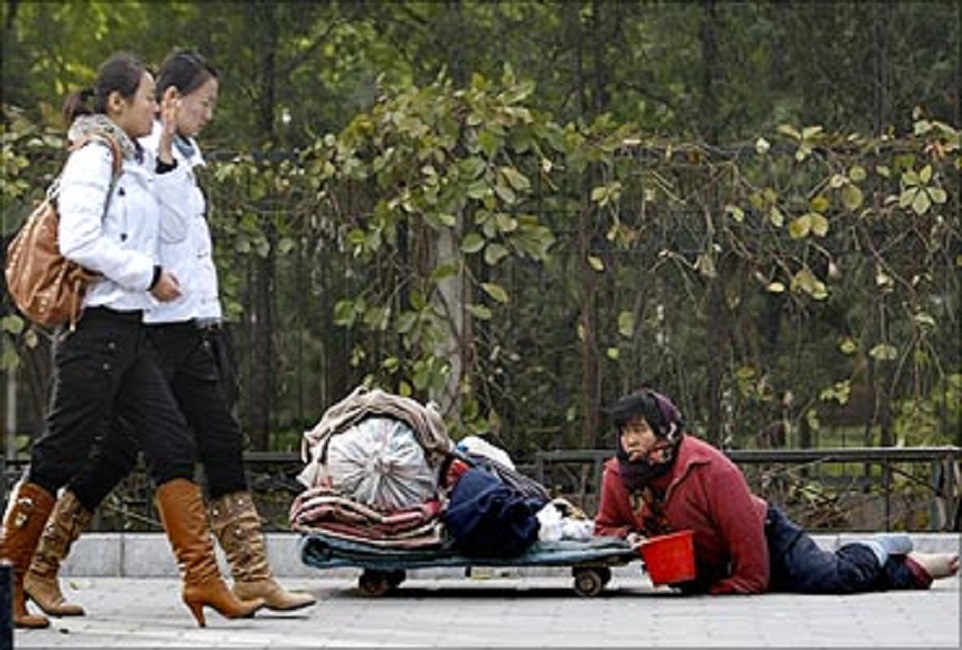
World’s poorest will take over 10 years to recover financially from pandemic
Page 17 of 50